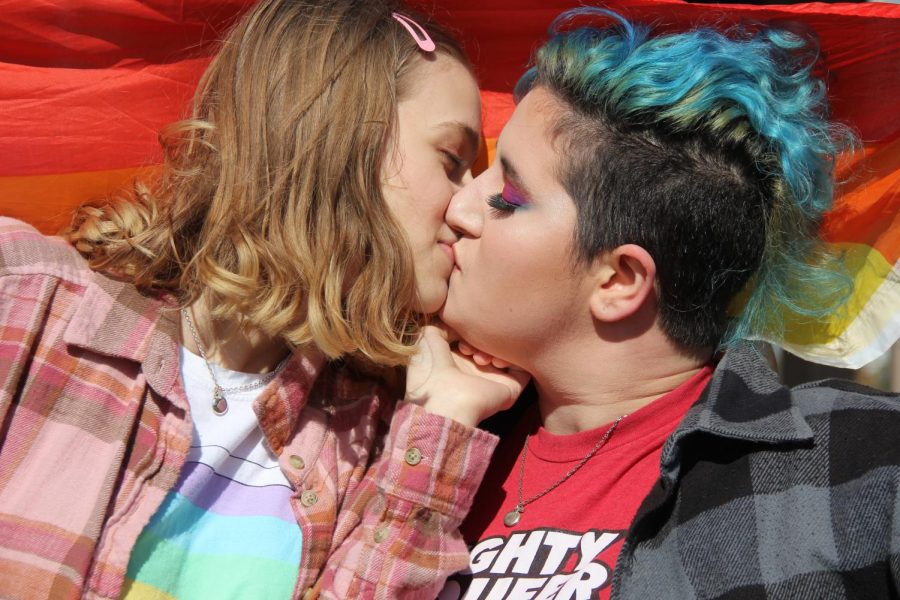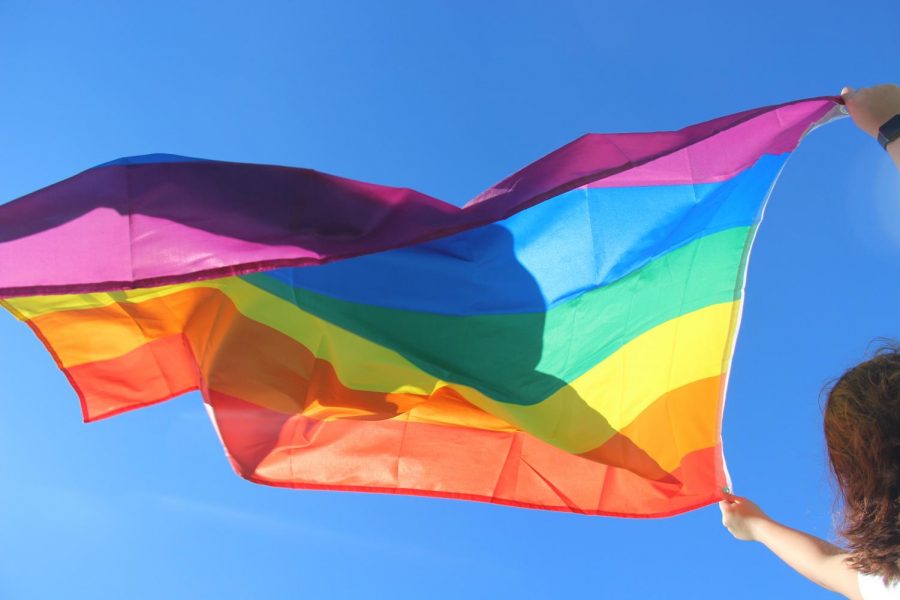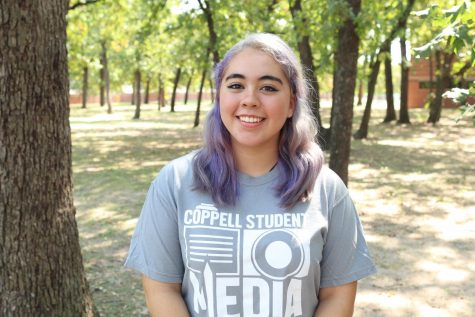Being gay is not a trend
Coppell High School juniors Jordyn Morris and Abigail Simon represent the LGBTQ+ community in Coppell. The Sidekick staff writer Camila Villarreal explores the challenge of being gay in America and the types of homophobia gay people in Coppell face on a regular basis.
January 24, 2020
Being queer is not like being straight.
When you are straight, you never worry about whether people will leave you because of who you cannot help but love or hear the words, “OK, just don’t hit on me, please” when you come out to someone for being straight – which you would ever do anyway. Most importantly, you never worry whether your parents will be ashamed of you or ignore you as if they are avoiding a problem.
“When you’re straight, people don’t care about your sex life, but if they find out you’re gay, that’s what they’ll lead with. That’s what they’ll see you as,” Coppell High School Principal Laura Springer said. “It saddens me that we are so judgemental and so worried of something different than us. How sad that we think [gay people] should have to hide themselves, because it is amazing what happens in someone’s life when they are accepted for who they are.”
To be fair, being gay today is a lot easier than it was 40 years ago. In 1977, only 43% of the population believed same-sex marriages should be legal. Today, that number has nearly doubled. Seventy-five percent of Americans support gay adoption rights and 93% believe gay people should have equal access to all jobs.
Approximately nine million Americans are gay. That is around 3.8% of the population. Roughly 8% of all high school kids reported being gay, lesbian or bisexual. Our presence is felt internationally and because of that, studies show that Americans overestimate the number of queer people by more than five times the actual percentage. This, the queer community is realizing, leads to homophobic outrage and the all-too-familiar complaint that “everyone is gay now.”
From drag races to wild hair colors to eccentric makeup, queer culture has seduced the Internet worldwide. Because the culture is emerging, so are the people. In truth, homosexuality can be traced back for centuries, but the idea was so repressed in previous societies that hardly anyone noticed it. As the years went by, the queer communities grew and the world became a more inclusive place for them.
It was not so easy to get there though. Gay violence and discrimination has been around just as long as gay people have. A survey by the Centers for Disease Control and Prevention found that 47% of transgender women have experienced sexual assault at some point in their life. In 1980, a former psychology instructor published false studies “proving” gay people commit more severe crimes. In 2000, the United States Supreme Court ruled to continue to ban gay scoutmasters for the Boy Scouts of America.
“When I was hitting puberty I [endured] a lot of self-hate because I realized I was a girl who likes girls,” CHS junior Abby Smith said. “But there are a lot more people out there to support [queers] than you’d originally think, it’s about reaching out as much as you can to find someone who gets it.”
With all those people and all that history behind us, it is the equivalent to a slap in the face when people dismiss us and our sexualities as a trend simply because we took advantage of our right to exist and express ourselves. We do not withstand years of inner-confusion, exclusion, fear and homophobia because that’s what’s in right now, and we do not love who we love because all of our friends are doing it. Sexuality is not the same as poodle skirts from the 50s or mullets from the 80s.
“If you are truly part of the LGBT community, you don’t [come out] for the hashtag, you do it for the sake of feeling in your own skin,” CHS LOTE teacher Michael Egan said. “I was disowned twice in my life by two families – my biological parents as a baby and my [adopted] family when I came out. But the beauty of what these people chose to do by walking through the fire is getting to choose a family.”
Sexuality is one small fraction of what makes up a person, but that small fraction may or may not have come at a big cost to the person behind it. Demoting someone else’s life as a fad in today’s world where the spectrum of lifestyles is grand and glorious is, if it is not yet apparent, rude.
Being gay is not a trend. The queers are here to stay.
Words of advice from the Coppell queer community, to the Coppell queer community
“Find your group. Find your family, which is the one that will accept and support you and love you. People should honor you for the person you are, not your sexuality. Make sure that you don’t get so caught up in people not liking that one part of you that you end up not liking yourself.” -Laura Springer
“It gets better. Life, especially for teenagers, can be such a landmine for someone who is discovering and developing themselves. Time heals all wounds. Once you get out of high school you’ll be more confident in who you are and more proud of who you are.” -Michael Egan
“Don’t worry about who will turn away from you when you come out. You’ll find that there’s more people to support you than you think. Those who don’t are not needed in your life.” – Marty Hightower
“Don’t be afraid to stand up for yourself if someone says something you’re uncomfortable with or something that is [unintentionally] offensive. Telling [people] that will not only help you but other people in the LGBT+ community.” –Xander Davila
“Stay strong and confident in your identity even if it feels like no one is standing by your side.” -Jordyn Morris
“You’re still valid even if you’re out or not. Just because you’re closeted doesn’t make you any less of the person you know you are.” -Shreya Joshi
Follow Camila Villarreal (@fliipthewriter) and @CHSCampusNews on Twitter.














Rebeca • May 4, 2022 at 1:17 am
All the first statements are wrong. Being straight doesn’t equal not being judged by your sex life etc. And even though I agree that it’s not a trend, it has become a trend. It’s the new cool thing.
Bill Stanley • Mar 5, 2022 at 5:02 pm
Unfortunately there are some who identify simply because they think it’s cool. How else do you explain a rate of identification that’s double that of countries where lgbtq individuals have far more rights than in the US such as Canada and the Nordic countries and that in a single generation. The rate of identification has been in line with those countries for decades but suddenly twice the rate appeared in the US in just a few years? In Canada it’s 3.3%, Sweden and Denmark 3-4%. It was around the same in the US for decades. Now it’s suddenly double? Not just double the rate of the US which one could say was due to oppression but double the rate of Canada and Sweden? And this is quite unfair to those who are actually lgbtq and not riding the rainbow wave because it’s cool now.
Aubrie morgan • Dec 27, 2021 at 6:09 pm
yes thank you my mom judges me for being lesbian saying “Your just doing it cuz its a trend”but i really am!nobody can chang the minds of people that know what there Sexuality is!
Samantha Freeman • Feb 10, 2020 at 9:41 pm
Outstanding story Camila! I cannot express how impressed I am with your writing style and storytelling. Can’t wait to see whose story you tell next!
Charlotte Vanyo • Jan 30, 2020 at 3:20 pm
This story is amazing and so so important. I love the quotes you included at the end Camila and Tracy’s photos look beautiful. I’m super proud of both of y’all:.)
Angela Yuan • Jan 27, 2020 at 10:41 pm
These photos are beautiful, Tracy! This is such an important topic and you two did a great job
Victoria Hertel • Jan 27, 2020 at 9:06 pm
This story is so moving and you did an outstandingly beautiful job, Camila.
Nanette • Jan 27, 2020 at 12:36 pm
I really love this story and the photos are everything, great job!
Akhila Gunturu • Jan 24, 2020 at 6:14 pm
This is so well-written and the visuals look amazing! Good job Camila!
Anthony Cesario • Jan 24, 2020 at 2:46 pm
This story is so powerful and important. Great job Camila